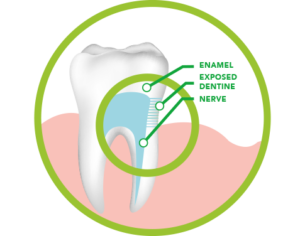Reducing enamel loss, broken teeth and tooth decay
BioMinF toothpaste contains slow-release fluoride, which can reduce the risk of enamel loss and subsequent tooth decay.
Tooth enamel is the hardest and most highly mineralised substance in the human body. It covers the outer layer of each tooth and is primarily made up of the mineral hydroxyapatite. Because it is semi-translucent, its colour can vary from light yellow to a greyish white dependent upon its thickness.
Enamel plays a very important role in protecting teeth from decay and sensitivity, so it is important to prevent damage and erosion. Enamel forms a strong barrier that shields the inner dentine layers of teeth from the effects of acids and plaque, and protects against sensitivity to hot and cold foods and beverages.
Once lost, tooth enamel cannot be replaced. It is unable to regenerate because, unlike other parts of the body, it does not contain any living cells.
To protect tooth enamel it is best to limit the intake of damaging sugary foods and acidic beverages. These foodstuffs stick to the tooth’s surface and combine with bacteria in the mouth to produce acids that can dissolve tooth enamel. It is important to clean teeth regularly (twice per day) and remove these foods before they can cause damage. It is also advised that biting into very hard foods such as boiled sweets and toffees can cause the enamel to crack or chip and should be avoided.
Regular visits to the dentist coupled with good oral hygiene habits, including flossing and the regular brushing with BioMinF containing toothpaste, can reduce the risk of enamel loss and subsequent tooth decay.

Related articles
Benefits of fluorapatite
Fluorapatite is more resistant to acid than tooth enamel (hydroxyapatite) and hence gives greater protection against acid attack. Conventional toothpaste introduces fluoride during brushing, however, the fluoride rapidly diminishes at an exponential rate.
Bioactive glasses dissolve under acidic conditions to protect teeth.
When faced with an acid challenge as a result of bacteria metabolising sugars or drinking an acidic beverage the glass dissolves. Quickly raising the pH and releasing calcium phosphate and fluoride ions to minimise the acid dissolution of the enamel apatite crystals.
Enamel, Demineralisation and Remineralisation
The BioMinF molecule is able to slowly release fluoride, calcium and phosphate ions over a period of 8 to 12 hours. Effectively reducing demineralisation and help to increase remineralisation of the tooth and fight decay.
